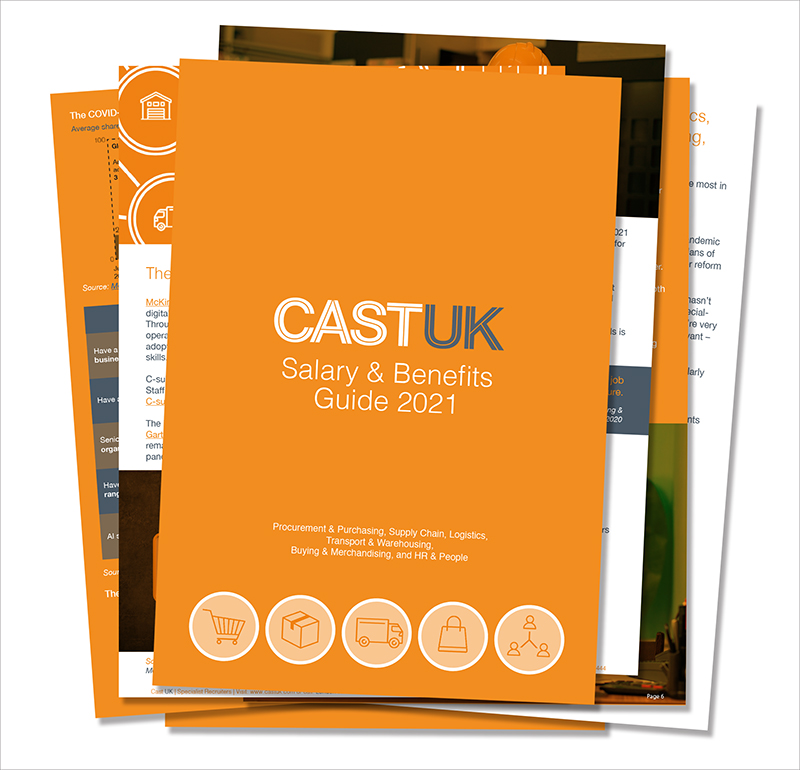
Matthew Owen
May 07, 2021
Logistics, Transport And Warehousing: 2021 Recruitment Trends To Expect
It's possible that logistics, transport & warehousing is one of the few winners of the pandemic. Having experienced increased demand from a larger customer demographic, 2021 is shaping up to be a successful year for the specialism, even if it is another year underlined by unknowns. We’ve collated insights from those working within the specialism to determine 2021’s recruitment trends – from the experience and skills required, to the in-demand roles, to what candidates are looking for from their current and future employers. Read on to discover what to expect from logistics, transport & warehousing this year.
Skills and experience
Unsurprisingly, 2020 caused a shift towards technological understanding and ability – 3PL has seen a surge for business data and analytical skills especially. Automation and eCommerce experience is now highly sought after, with the latter triggering a call for hybrid roles such as ‘Head of Creative’ (requiring an eCommerce, marketing and strategy background). What's more, experience working in a fast-paced logistics environment is no longer enough. Handling technical demand has brought about a need for omnichannel understanding, and talent that can wear many hats will find themselves at the top of the recruitment shortlist. The pandemic has thrown the spotlight on the need for a multi-skilled workforce, and many businesses now face a restructure. Change management skills are therefore a high priority. In the present climate, organisations need individuals with the mindset to transform a business.
It’s now necessary for those in higher-level roles to have ‘softer’ mentoring and leadership skills as a result. In this way, they can ensure teams are successfully taken on the transformation journey with them – something that’s particularly important when managing entry-level talent. They also need to show empathy and engage more, which is key if the company has a flatter structure (or is moving towards one).
Types of roles
As for the jobs in demand? Well, Brexit has changed things - especially because many businesses weren't prepared in time. Where standard shipping roles were previously carried out by admin staff, there's now a requirement for talent that can deal with customs documentation and systems, and handle freight forwarders. This kind of talent is so scarce it has triggered a 30-40% increase in salaries.
Some businesses are considering applying for the government's Kickstart Scheme, where funding covers up to 25 hours per week of an employee’s wage (provided they’re aged 16-24, and meet certain criteria). They can then be trained up in the sought-after customs roles. The pandemic also increased the demand for health and safety positions. However, it's expected that this will fall as the repercussions of the situation are brought under greater control.
What candidates want
Candidates are drawn to fast-growing tech businesses – particularly ones with investment behind them, where those in senior roles know they have the option to grow and add value. Specific recruitment trends for these higher-level positions in tech companies and start-ups include offering a share-buying scheme, higher allowances for shift work, and increased pension contributions. Desirable companies have accompanied this with a wider range of benefits, such as healthcare plans, dental insurance and support with travel costs.
Research for our 2021 Salary & Benefits Guide has found that increased holiday allowance is also appealing, especially as candidates now seek a better work-life balance. Monetary matters are similarly important - with an uncompetitive salary listed as one of the most likely reasons to look for another role. Having said this, candidates care equally about the values of an organisation, and are becoming more interested in greener logistics companies, such as those that are going 100% electric for their last mile delivery vehicles. The care they showed for their employees is also paramount. Over 75% of candidates indicated that they were hugely satisfied by their employer's safety responses to the pandemic - a significant outcome given that the logistics, transport & warehousing specialism is made up of essential workers. Maintaining this sense of stability and strength extends to the company's finances.
We work with one organisation that paid back the government's furlough grant, which impressed candidates as it showed that they're financially sound. It's always worth looking at share prices of public companies to see how they're valued on the markets.
Explore further trends in our exclusive guide
Cast UK's Salary & Benefits Guide 2021 takes a deep dive into this specialism, as well as procurement & purchasing, supply chain, buying & merchandising, and HR & people. It looks in more detail at the recruitment trends for this year, the impact of the pandemic and Brexit, and guidance around IR35 and technological and economic disruption.
Download the full guide today to get all the insights



